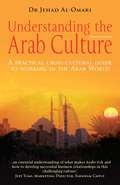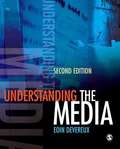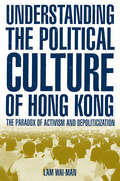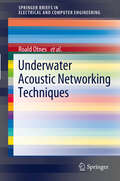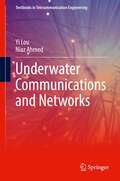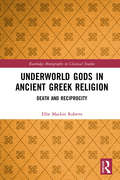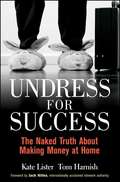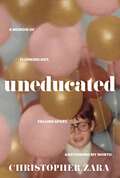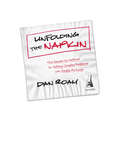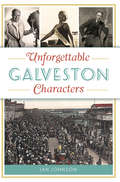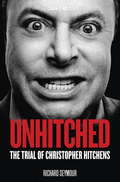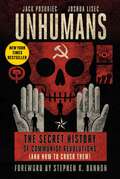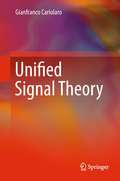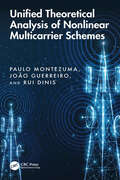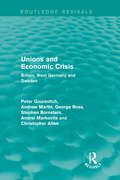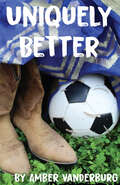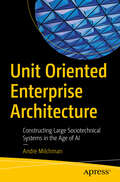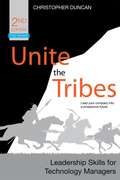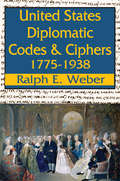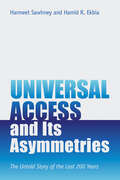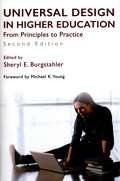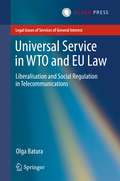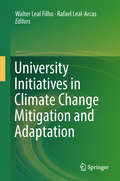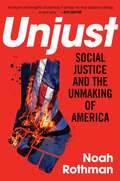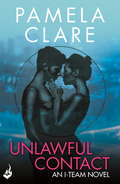- Table View
- List View
Understanding the Arab Culture, 2nd Edition: A practical cross-cultural guide to working in the Arab world
by Jehad Al-OmariUnderstanding the Arab Culture is a thoroughly practical crosscultural guide to working with Arab cultures, written with theWesterner in mind.The book focuses more on the key differences than similarities, issues that Westerners will find puzzling, unusual or difficult to cope with. It is based on years of experience of lecturing to Westerners and a long list of frequently asked questions. It addresses Western perceptions and misconceptions of Arabs, Islam and the Arab world as well as some key Arab perceptions of the West. Many practical tips are given on a variety of issues, from exchanging appropriate gifts to negotiating techniques.Contents: Preface; About the author; Acknowledgements; Introduction; 1. A cross-cultural Perspective; 2. Ten cross-cultural realities; 3. The Arab culture in a generic context; 4. The business pyramid; 5. An Arab perspective; 6. First encounters with Arabs; 7. Values and attitudes; 8. Experiencing Arabia; 9. Islam: away of life; 10. Doing business; Epilogue; Recommended reading; Index.
Understanding the Media
by Eoin Devereux'The second edition of Understanding the Media updates what has been recognised as a successful introduction to the study of the mass media.... The author furnishes examples from all around the world, underpinning the emphasis the book places on the concept of globalisation in understanding the modern media. The readings and questions force students to reflect critically on issues and encourage them to explore their own media-consumption habits.... The chapters are well organised and user friendly, with the chapter on globalisation highly recommended. Introductions to media globalisation often fail to provide a succinct and clear overview for first-year students - this chapter cracks the problem with a pithy description of the basic concepts and debates, interlaced with illuminating case studies and illustrative examples... The strength of Eoin Devereux's text is that the examples are familiar and relevant to present-day students and his style does not patronise or talk down to them.... Clearly written, comprehensive, well organised and up to date... This is an excellent introductory text for media studies students' - Times Higher Education Praise for the first edition: `An interesting book to read, written in a simple and transparent style and interlaced with topical, up-to-date examples of media events' - Journal of Educational Media 'This is...a well-organized, well-informed, student-friendly textbook, ideal for first-year undergraduates as a kicking-off point into the field of media and communications research. It deserves to be widely taken up' - European Journal of Communication Understanding the Media introduces key theoretical issues in media analysis and encourages students to use case studies to examine their own personal media use and exposure. Devereux applies a model of media analysis that gives equal weight to the production, content and reception of media texts. A particular emphasis is placed on understanding the mass media in a social context, and readers are invited to engage with a variety of questions about the increasingly complex mediascape in which we live our everyday lives. Now thoroughly revised and expanded this Second Edition: " Includes an additional chapter which draws together the book's key themes " Contains new and revised case studies with expanded discussions on media audiences and fandom and 'blogging' " New and revised extracted readings in every chapter " In addition, the book is now accompanied by an ancillary website with resources for students as well as slides for tutorials/lectures. Each chapter contains concise summaries, exercises, extracts from experts in the field, model exam and essay questions, as well as directions for further reading and research. This practical dimension to Understanding the Media will ensure that the book appeals to both teachers and students of the media in the 21st Century.
Understanding the Political Culture of Hong Kong: The Paradox of Activism and Depoliticization (Asia And The Pacific/hong Kong Becoming China Ser.)
by Lam Wai-manThis book challenges the widely held belief that Hong Kong's political culture is one of indifference. The term "political indifference" is used to suggest the apathy, naivete, passivity, and utilitarianism of Hong Kong's people toward political life. Taking a broad historical look at political participation in the former colony, Wai-man Lam argues that this is not a valid view and demonstrates Hong Kong's significant political activism in thirteen selected case studies covering 1949 through the present. Through in-depth analysis of these cases she provides a new understanding of the nature of Hong Kong politics, which can be described as a combination of political activism and a culture of depoliticization.
Underwater Acoustic Networking Techniques
by Michele Zorzi Michael Goetz Paul Van Walree Roald Otnes Ivor Nissen Knut Rimstad Thor Husøy Alfred Asterjadhi Paolo CasariThis literature study presents an overview of underwater acoustic networking. It provides a background and describes the state of the art of all networking facets that are relevant for underwater applications. This report serves both as an introduction to the subject and as a summary of existing protocols, providing support and inspiration for the development of network architectures.
Underwater Communications and Networks (Textbooks in Telecommunication Engineering)
by Yi Lou Niaz AhmedThis textbook covers all related communication technologies of underwater wireless communication, such as acoustic communication, optical communication, and magneto-inductive communication. After describing each technology, the authors relay their pros and cons, as it is essential to learn the underlying mechanism, advancements, and limitations of these techniques. Therefore, this book provides basics fundamentals of the three technologies, their advantages and disadvantages, and their applications. The authors also introduce research trends, pointing readers in the direction of research in the field of underwater wireless communication. The book is an essential textbook for undergraduate and graduate students in the field of underwater communications. The book is also useful as a reference to undergraduate engineering students, science students, and practicing engineers. The book includes end-of-chapter questions and numerical problems.
Underworld Gods in Ancient Greek Religion: Death and Reciprocity (Routledge Monographs in Classical Studies)
by Ellie Mackin RobertsThis volume presents a case for how and why people in archaic and classical Greece worshipped Underworld gods. These gods are often portrayed as malevolent and transgressive, giving an impression that ancient worshippers derived little or no benefit from developing ongoing relationships with them. In this book, the first book-length study that focuses on Underworld gods as an integral part of the religious landscape of the period, Mackin Roberts challenges this view and shows that Underworld gods are, in many cases, approached and ‘befriended’ in the same way as any other kind of god. Underworld Gods in Ancient Greek Religion provides a fascinating insight into the worship of these deities, and will be of interest to anyone working on ancient Greek religion and cult.
Undress for Success: The Naked Truth about Making Money At Home
by Kate Lister Tom HarnishThis book is for the bummed out, burned out, and stressed out professional, stay-at-home parent, or retiring boomer who dreams of a home-based job or business, but doesn't know how to make that dream a reality. Unlike the many "change-your-life" books that promise much and deliver little-Undress4Success provides expert, practical advice about: 1) what home-based jobs are available, what talents they require, what they pay, who's hiring, and how to land one; 2) how to use the Web to search for work-at-home jobs and business opportunities without being scammed; 3) how to turn professional talents into a freelance business; and 4) how to convince an employer to adopt a telecommuting program. Based on interviews with dozens of employers, home-based employees, successful freelancers, and leading telework researchers, this book shows readers the way home.
Uneducated: A Memoir of Flunking Out, Falling Apart, and Finding My Worth
by Christopher ZaraIn this &“hilarious and heartbreaking...must-read memoir&” (Publishers Weekly), Christopher Zara breaks down his winding journey from dropout to journalist and the impact that his background had in the world of privilege. Boldly honest, wryly funny, and utterly open-hearted, Uneducated is one diploma-less journalist&’s map of our growing educational divide and, ultimately, a challenge: in our credential-obsessed world, what is the true value of a college degree? For Christopher Zara, this is the professional minefield he has had to navigate since the day he was kicked out of his New Jersey high school for behavioral problems and never allowed back. From a school for &“troubled kids,&” to wrestling with his identity in the burgeoning punk scene of the 1980s; from a stint as an ice cream scooper as he got clean in Florida, to an unpaid internship in New York in his thirties, Zara spent years contending with skeptical hiring managers and his own impostor syndrome before breaking into the world of journalism—only to be met by an industry preoccupied with pedigree. As he navigated the world of the elite and saw the realities of the education gap firsthand, Zara realized he needed to confront the label he had been quietly holding in: what it looked like to be part of the &“working class&”—whatever that meant.Book Riot's Eight New Nonfiction Books to Read in May Book Browse's Best Books of May 2023
Unfolding the Napkin: The Hands-On Method for Solving Complex Problems with Simple Pictures
by Dan RoamAn original workbook companion to the acclaimed business bestseller The Back of the Napkin Dan Roam's The Back of the Napkin, a BusinessWeek bestseller, taught readers the power of brainstorming and communicating with pictures. It presented a new and exciting way to solve all kinds of problems-from the boardroom to the sales floor to the cubicle jungle. The companion workbook, Unfolding the Napkin, helps readers put Roam's principles into practice with step-by-step guidelines. It's filled with detailed case studies, guided do-it-yourself exercises, and plenty of blank space for drawing. Roam structured the book as a complete four-day visual-thinking seminar, taking readers step-by-step from "I can't draw" to "Here is the picture I drew that I think will save the world." The workbook teaches readers how to: *Improve their three "built-in" visual problem solving tools. *Apply the four-step visual thinking process (look-see-imagine-show) in any business situation. *Instantly improve their visual imaginations. *Learn how to recognize the type of problem to choose the best visual solution. If The Back of the Napkin was a guide to fine dining, Unfolding the Napkin is the cookbook that will soon be heavily marked up and dogeared.
Unforgettable Galveston Characters (American Chronicles)
by Jan JohnsonFrom financiers of the Texas Revolution to contestants in the Pageant of Pulchritude, the shores of Galveston enticed and cultivated a host of memorable men and women. Bishops and bookies, concert pianists and cotton tycoons--all left an indelible print on their remarkable home. Magnolia Willis Sealy and the members of the Women's Health Protective Association reshaped the ravages of the Great Storm into the glories of the Oleander City. The benevolent activism of Norris Wright Cuney transformed the social landscape, while actress Charlotte Walker and painter Boyer Gonzales Sr. extended the island's cultural reach abroad. Jan Johnson keeps company with Galveston's most fascinating characters.
Unhitched
by Richard SeymourAmong the forgettable ranks of ex-Leftists, Christopher Hitchens stands out as someone determined to stand out. Rejecting the well-worn paths of hard-right evangelism and capitalist "realism," he identified with nothing outside his own idiosyncrasies. A habitual mugwump who occasionally masqueraded as a "Marxist," the role he adopted late in his career, as afree radical within the US establishment, had ample precedents from his earlier incarnation. It wasn't the Damascene conversion he described. His long-standing admiration for America, his fascination with the Right as the truly "revolutionary" force, his closet Thatcherism, his theophobia and disdain for the actually existing Left had all been present in differentways throughout his political life. Post-9/11, they merely found a new articulation.For all that, the Hitchensian idiolect was a highly unique, marketable formula. He is a recognizable historical type--the apostate leftist--and as such presents a rewarding, entertaining and an enlightening case study.
Unhumans: The Secret History of Communist Revolutions (and How to Crush Them)
by Jack Posobiec Joshua LisecUSA TODAY and PUBLISHERS WEEKLY NATIONAL BESTSELLER If you don&’t understand communist revolutions, you aren&’t ready for what&’s coming. The old rules are over. The old order is over. Accusations are evidence. Activism means bigotry and hate. Criminals are allowed to roam free. Citizens are locked up. An appetite for vengeance is unleashed—to deplatform, debank, destroy. This is the daily news, yet none of it&’s new. Patterns from the past make sense of our present. They also foretell a terrifying future we might be condemned to endure. For nearly 250 years, far-left uprisings have followed the same battle plans—from the first call for change to last innocent executed, from denial a revolution is even happening to declaration of the new order. Unhumans takes readers on a shocking, sweeping, and succinct journey through history to share the untold stories of radical takeovers that textbooks don&’t teach. And there is one conclusion: We're in a new revolution right now. But this is not a book about ideology or politics. Unhumans reveals that communism, socialism, Marxism, and all other radical-isms are not philosophies but tactics—tactics that are specifically designed to unleash terror on everyday people and revoke their human rights to life, liberty, and property. These are the forces of unhumanity. This is what they do. Every. Single. Time. Unhumans steals their playbook, breaks apart their strategies piece by piece, and lays out the tactics of what it takes to fight back—and win, using real-world examples. Unhumans is an essential read for every concerned citizen both in the US and worldwide. We must stop what is coming.
Unified Signal Theory
by Gianfranco CariolaroUnified Signal Theory is an indispensible textbook dealing with the theory of deterministic signals; a topic of fundamental interest to graduates and senior undergraduates in the areas of information engineering (telecommunications, control, systems theory and electronics), astronomy, oceanography, earth science, biology and medicine. The unified theory follows an innovative approach - that of combining all signal classes into just one. The fundamental signal operations (convolution, Fourier transform, linear systems, sampling and interpolation) are established simultaneously for all the signal classes. This unified approach avoids the repetition of similar concepts consequent on other approaches' separate treatment of definitions and properties for each signal class. Modern wavelet ideas are developed in harmony with the rest of the text. Unified Signal Theory provides: * exercises and examples, to give the student practice; * solutions which are available for download and save the tutor time; and * a choice of two suggested reading paths depending on the level of the student, for an enhanced learning experience. The advantages of the unified approach are many: it permits a global vision of the topic, it is economical in teaching and learning, and it can be adjusted easily to fit new applications. This textbook presents the theory in five chapters, and goes on to demonstrate specific applications such as fast Fourier transform implementation, sampling and reconstructions of signals, and multicolor modulation systems, in a further six chapters. Mathematical concepts are introduced conceptually within the body of the book with more rigorous treatment being reserved for the appendices.
Unified Theoretical Analysis of Nonlinear Multicarrier Schemes
by Paulo Montezuma Rui Dinis João GuerreiroThis book provides the analytical tools to characterize nonlinear distorted multicarrier signals and optimal/sub-optimal receivers employed in high data rate communication systems.Unified Theoretical Analysis of Nonlinear Multicarrier Schemes introduces new optimal and sub-optimal receivers for nonlinear distorted signals that can use nonlinear distortion to improve performance when compared with common receivers. It addresses the analysis of nonlinear systems with stochastic inputs and establishes new receivers designs for multi-carrier communication systems with nonlinearities. The authors also include the characterization and definition of optimum and sub-optimum receivers for nonlinear distorted signals that may use the nonlinear distortion to improve receiver performance over the existing ones. The book also includes a set of applications where the analytical unified method for characterization of nonlinear distortion can be applied. The two final chapters of the book include systems like MIMO OFDM and the extension to optical systems. These techniques are the base of 5G, Wi-fi and future 6G mobile networks.The book will be a valuable resource for design engineers, industrial engineers, applications engineers and researchers working on multi-carrier systems, power amplifiers modelling and design.
Unions and Economic Crisis: Britain, West Germany and Sweden (European Trade Unions and the 1970s Economic Crisis #2)
by Andrew Martin George Ross Christopher Allen Andrei Markovits Peter Gourevitch Stephen BornsteinFirst published in 1984. This book represents a major study of union responses to the economic crisis of the 1970s and 1980s. Abjuring governmental or managerial outlooks, it argues that unions, as representatives of essential producer groups, would be central to the renegotiation of the economic world. The work also stresses the importance of situating union responses to the crisis within the socio-historical evolution of their political economies during the rise and decline of the post-war economic boom. The Social Democratic affiliation of unions in Britain, West Germany and Sweden make them particularly comparable. This title will be of interest to students of politics and economics.
Uniquely Better
by Amber VanderburgIn 2016, Amber Vanderburg left her corporate job to become the only American, only female, and only blonde Academy football coach for the Paris Saint Germain Academy and Gameday Academy in Bangalore, India. As she emerged into the land of masala and chai, she found remarkably talented and driven players who were operating under a strict command-obey dynamic. Players would stand in a line, kick a ball, wait for direction. While this may be an effi cient way to teach a skill, in a game scenario, it was not effective. She witnessed players kick the ball during matches then turn to the sideline for future instruction. She noticed that the players had mastered tasks but didn't understand the game application. We see these parallels in our business life every day. People come to work, receive a task, and wait for instruction. Opportunities for ownership in teams establish opportunities to be uniquely better - Join Amber in her powerful story of team transformation; of daring adventures; of an exciting future in the beautiful land of India; of working within multicultural teams; of remarkable athletes coming together to build something great; of how teams can establish competitive advantage, and of a hometown Okie trying her best.
Unit Oriented Enterprise Architecture: Constructing Large Sociotechnical Systems in the Age of AI
by Andre MilchmanExamine a new approach to Enterprise Architecture (EA) that challenges conventional practices and supports a transformative shift to address the demands of a rapidly evolving technological landscape. This book offers alternatives to traditional EA methods that often divide the enterprise into isolated business, application, data, and technology architectures, often resulting in disjointed operations and missed opportunities for innovation. By proposing an innovative, purpose-driven architectural style, this book emphasizes the need for a cohesive and adaptive framework that aligns all components of an enterprise with its strategic goals. Key concepts explored include the integration of social and technical elements in building large sociotechnical systems, the introduction of Unit Oriented Enterprise Architecture (UOEA) for modular and adaptable enterprise design, and the importance of Purpose Driven Design (PDD) in ensuring operational efficiency and strategic alignment. You’ll also gain insights into organizing software engineering in the cloud era, streamlining enterprise interactions, and embracing creative destruction to foster technological harmony. Unit Oriented Enterprise Architecture is your essential resource for system architects, organizational leaders, IT professionals, and students seeking to revolutionize their approach to enterprise architecture and position their organizations for success in the digital age. What You Will Learn Critically assess and dismantle outdated EA concepts to create a more adaptive and cohesive architectural framework. Explore how UOEA can enhance agility and adaptability, allowing your organization to respond more effectively to change. Organize and manage software development within cloud infrastructures, ensuring clarity, scalability, and alignment with your architectural framework. Who This Book Is For Primary Audience: Enterprise architects, organizational leaders, IT professionals; Secondary Audience: Consultants, advisors, and policymakers; Tertiary Audience: Students in system design and organizational studies, academic researchers
Unite The Tribes
by Christopher DuncanEvery day, customers see the results of companies where fiefdoms have formed and silos create divisional or departmental strife: poor sales and profits, and lackluster products. It's not hard to see that such companies are headed for an early grave. Regardless of the manner in which company fractures manifest themselves, tech leaders must find a way to rid their workplaces of the divisions that threaten to undermine their company's productivity, profits, and survival. That's why, in Unite the Tribes: Leadership Skills for Technology Managers, Christopher Duncan, bestselling author of The Career Programmer, provides corporate leaders with a ten-point plan for joining their company's divided ranks together in a way that helps employees achieve their goals while also accomplishing those of the company. Using the metaphors of the company as empire and the groups that form within companies as tribes, Duncan explains that the formation of tribes within an empire is unavoidable. After all, regardless of the situation in which they find themselves, human beings are social creatures who align themselves with those whose goals and motivations match their own. That's why the accountants hang together in the break room, while developers talk shop and geek culture in a watering hole down the street. Yet the job of leaders is to build a cohesive, powerful, and enduring empire by bringing all groups together in service to a shared, inspiring mission. And that goes double for tech companies, where breakthroughs create new landscapes on a daily basis. In Unite the Tribes, you will learn: How to build alliances and a spirit of unity across all levels of the company to achieve higher employee morale, greater profits, and increased productivity. How to come up with strategies that win market share as well as the hearts and minds of your employees. How to manage conflict. Why self-interest rules the day and how knowing another's wants and needs helps you achieve goals of your own. Unite the Tribes will show you, the visionary leader, how to establish an empire by convincing your tribes of a simple but crucial truth: Alone, you are weak and vulnerable. United, you are invincible. What you'll learn Readers of Unite the Tribes will learn: Practical, down-to-earth approaches to problem solving and productivity that make sense to corporate leaders who have to do real work in the real world. How to arrive at a plan for uniting the disparate groups that operate within their company when faced with the daily reality of office politics, maneuvering, ambition, incompetence, and short-term thinking. How to convey the company's purpose to employees in a way that is realistic and meaningful so that all workers can contribute to the company's greater good. Who this book is for Those serving in leadership or managerial capacities (i. e. , those overseeing one or more employees) at technology companies plagued with division and dysfunction will find the solutions they need to rally their employees to join forces in Unite the Tribes. In addition, leaders and managers of companies whose cohesion is still healthy yet is being threatened with fracture will be provided with real-world strategies for reinforcing the glue that holds their company together in this practical, applications-driven guide. Table of Contents The Myth of Absolute Power Building the Future A Lasting Empire Vision Leadership Organization Mobility Competitiveness Persuasion Strategy Brilliance Morale Unite
United States Diplomatic Codes and Ciphers, 1775-1938
by Ralph E. WeberUnited States Diplomatic Codes and Ciphers, 1775-1938 is the first basic reference work on American diplomatic cryptography. Weber's research in national and private archives in the Americas and Europe has uncovered more than one hundred codes and ciphers. Beginning with the American Revolution, these secret systems masked confidential diplomatic correspondence and reports.During the period between 1775 and 1938, both codes and ciphers were employed. Ciphers were frequently used for American diplomatic and military correspondence during the American Revolution. At that time, a system was popular among American statesmen whereby a common book, such as a specific dictionary,was used by two correspondents who encoded each word in a message with three numbers. In this system, the first number indicated the page of the book, the second the line in the book, and the third the position of the plain text word on that line counting from the left. Codes provided the most common secret language basis for the entire nineteenth century.Ralph Weber describes in eight chapters the development of American cryptographic practice. The codes and ciphers published in the text and appendix will enable historians and others to read secret State Department dispatches before 1876, and explain code designs after that year.
Universal Access and Its Asymmetries: The Untold Story of the Last 200 Years (Information Policy)
by Hamid R. Ekbia Harmeet SawhneyA framework for understanding the totality of costs and benefits of universal access that will foster honest appraisal and guide the development of good policies.Universal access—the idea that certain technologies and services should be extended to all regardless of geography or ability to pay—evokes ideals of democracy and equality that must be reconciled with the realities on the ground. The COVID-19 pandemic raised awareness of the need for access to high-speed internet service in the United States, but this is just the latest in a long history of debates about what should be made available and to whom. Rural mail delivery, electrification, telephone service, public schooling, and library access each raised the same questions as today&’s debates about health care and broadband. What types of services should be universally available? Who benefits from extending these services? And who bears the cost? Stepping beyond humanitarian arguments to conduct a clear-eyed, diagnostic analysis, this book offers some surprising conclusions. While the conventional approach to universal access looks primarily at the costs to the system and the benefits to individuals, Harmeet Sawhney and Hamid Ekbia provide a holistic perspective that also accounts for costs to individuals and benefits for systems. With a comparative approach across multiple cases, Universal Access and Its Asymmetries is an essential exploration of the history, costs, and benefits of providing universal access to technologies and services. With a fresh perspective, it overturns common assumptions and offers a foundation for making decisions about how to extend service—and how to pay for it.
Universal Design in Higher Education: From Principles to Practice
by Sheryl E. BurgstahlerThis second edition of the classic Universal Design in Higher Education is a comprehensive, up-to-the-minute guide for creating fully accessible college and university programs. The second edition has been thoroughly revised and expanded, and it addresses major recent changes in universities and colleges, the law, and technology. As larger numbers of people with disabilities attend post secondary educational institutions, there have been comparable greater efforts to make the full array of classes, services, and programs accessible to all students. This revised edition provides both a full survey of those measures and practical guidance for schools as they work to turn the goal of universal accessibility into a reality. As such, it makes an indispensable contribution to the growing body of literature on special education and universal design. This book will be of particular value to university and college administrators, and to special education researchers, teachers, and activists.
Universal Service in WTO and EU law
by Olga BaturaThis book is a systematic comparative study of WTO and EU law relevant for universal service provision, and a timely contribution to the ongoing scholarly and policy debates about the concept and scope of universal service. Universal service is one of the most significant regulatory issues worldwide and it is likely to remain so. The central question dealt with by the author is how the technologically intensive sector of telecommunications services can be regulated in a socially fair way in the light of liberalisation and the immense importance of ICTs in the Information Society. The author investigates whether the legal frameworks of WTO and EU can meet the challenges of the rapid and dramatic technological and social change and formulates relevant policy recommendations. The book is of interest to both scholars and practitioners in several disciplines, such as EU and WTO law, telecommunications law and regulation, political science regarding market regulation and governance as well as European integration and WTO. Olga Batura is affiliated to the Leuphana Law School, University of Lüneburg, Germany, and to the European Humanities University in Vilnius, Lithania.
University Initiatives in Climate Change Mitigation and Adaptation
by Walter Leal Filho Rafael Leal-ArcasThis book focuses on the role of higher education institutions in addressing climate change mitigation and adaptation challenges, contributing to the development of this fast-growing field. Further, it includes the results of empirical research and offers ideas regarding on-going and future research initiatives. The contributions also• showcase the research and projects on issues pertaining to climate change at universities from across the globe;• document and promote ideas and experiences acquired in the execution of research projects, especially successful initiatives and best practices; and• introduce methodological approaches and projects that offer a better understanding of climate change across society and economic sectors.The book is structured around two parts: lessons learned from climate change research, education, studies and projects. Each part focuses on mitigation and adaptation respectively, with many responses of the two modalities overlapping.This book is a valuable resource for researchers and practitioners in the fields of environment, human geography, business and economics, as well as academics and students, as it presents education, communication and awareness-raising projects on matters related to climate change at universities in both industrialised and developing countries, often in cooperation with government bodies, NGOs and other stakeholders.
Unjust: Social Justice and the Unmaking of America
by Noah Rothman"An elegant and thoughtful dismantling of perhaps the most dangerous ideology at work today." — BEN SHAPIRO, bestselling author and host of "The Ben Shapiro Show" "Reading Noah Rothman is like a workout for your brain." — DANA PERINO, bestselling author and former press secretary to President George W. Bush There are just two problems with “social justice”: it’s not social and it’s not just. Rather, it is a toxic ideology that encourages division, anger, and vengeance. In this penetrating work, Commentary editor and MSNBC contributor Noah Rothman uncovers the real motives behind the social justice movement and explains why, despite its occasionally ludicrous public face, it is a threat to be taken seriously. American political parties were once defined by their ideals. That idealism, however, is now imperiled by an obsession with the demographic categories of race, sex, ethnicity, and sexual orientation, which supposedly constitute a person’s “identity.” As interest groups defined by identity alone command the comprehensive allegiance of their members, ordinary politics gives way to “Identitarian” warfare, each group looking for payback and convinced that if it is to rise, another group must fall. In a society governed by “social justice,” the most coveted status is victimhood, which people will go to absurd lengths to attain. But the real victims in such a regime are blind justice—the standard of impartiality that we once took for granted—and free speech. These hallmarks of American liberty, already gravely compromised in universities, corporations, and the media, are under attack in our legal and political systems.
Unlawful Contact: I-Team 3 (I-Team)
by Pamela ClareFans of Suzanne Brockmann, Maya Banks, Christy Reece, Julie Ann Walker and Cindy Gerard will adore Pamela Clare's expertly plotted romantic suspense series, which sets the pages alight with sizzling chemistry. For tension, thrills, romance and passion take a spin with the I-Team.Taken hostage by a convicted murderer while reporting at a prison, Sophie Alton has no idea that the man holding the gun to her head is the bad boy who was her first love in high school. Condemned to life without parole, Marc Hunter finds himself with no choice but to break out of prison after his younger sister disappears with her baby. Though he regrets what he has to put Sophie through, he can't let anything get in the way of stopping the corrupt officials who are set on destroying what's left of his family. But being near Sophie rekindles memories for both of them. And, as the passion between them heats up, so does the conspiracy to put both of them in their graves...Sexy. Thrilling. Unputdownable. Take a wildly romantic ride with Pamela Clare's I-Team: Extreme Exposure, Hard Evidence, Unlawful Contact, Naked Edge, Breaking Point, Striking Distance, Seduction Game.
